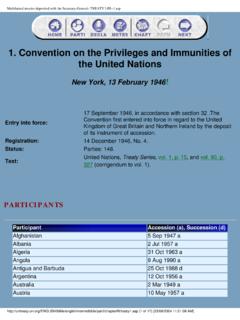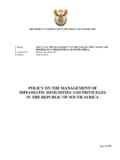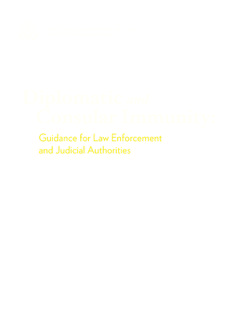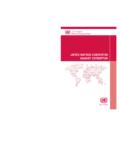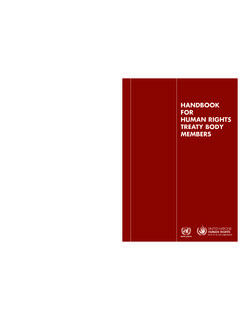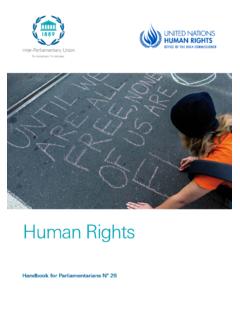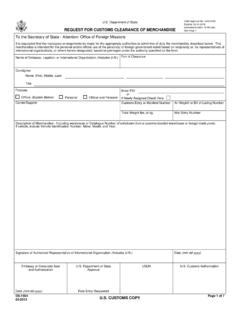Transcription of CouncilReferralstothe ICCand itsImpacton …
1 The Legal Nature of Security Council Referrals to the ICC and its Impact on Al Bashir's Immunities Dapo Akande*. Abstract This article considers whether states are obliged or permitted to arrest Sudanese President Omar al Bashir pursuant to a warrant of arrest issued by the International Criminal Court (ICC). The article considers the extent to which the ICC Statute removes immunities which would ordinarily be available to state officials. It is argued that the removal of the immunity by Article 27 of the ICC. Statute applies also at the national level, when national authorities act in support of the ICC.
2 The article examines the application of Article 98 of the ICC Statute and considers the legal nature of Security Council referrals to the ICC. It is argued that the effect of the Security Council referral is that Sudan is to be regarded as bound by the ICC Statute and thus by Article 27. Given that the Statute operates in this case not as a treaty but by virtue of being a Security Council resolution, the removal of immunity operates even with regard to non-parties. However, since any (implicit) removal of immunity by the Security Council would conflict with customary international law and treaty rules according immunity to a serving head of state, the article considers the application of Article 103 of the United Nations (UN) Charter in this case.
3 1. Introduction In issuing the arrest warrant for the Sudanese President, Al Bashir,1 the Pre-Trial Chamber (PTC) of the International Criminal Court (ICC) directed * Visiting Associate Professor of Law and Robina Foundation International Fellow, Yale Law School; University Lecturer in Public International Law and Yamani Fellow, St Peter's College and Faculty of Law, University of Oxford. 1 Decision on the Prosecution's Application for a Warrant of Arrest against Omar Hassan Ahmad Al Bashir, Al Bashir (ICC-02/05-01/09), Pre-Trial Chamber I, 4 March 2009 [henceforth: A l Bashir Arrest Warrant'].
4 Journal of International Criminal Justice 7 (2009), 333^352 Oxford University Press, 2009, All rights reserved. For permissions, please email: 334 JICJ 7 (2009), 333^352. the Registry to transmit a request for arrest and surrender of Al Bashir to (i) all states parties to the ICC Statute and (ii) all UN Security Council members that are not states parties to the Statute. States parties to the ICC Statute are under an obligation to cooperate with the Court and this includes obligations to comply with requests for arrest and The issuance of that arrest warrant raises the question whether the states receiving the request for arrest are under an obligation to arrest Al Bashir were he to travel to their territory.
5 In fact, one may go so far as to ask whether other states are even permitted by international law to arrest Al Bashir? These questions arise because under international law, serving heads of state are accorded immunity from the criminal jurisdiction of foreign Under customary international law, the person of the head of state is regarded as inviolable4 when abroad and immunity from criminal jurisdiction includes immunity from In addition, treaties may also confer immunity on the serving head of state when abroad, for example where the serving head of state is part of that state's delegation to an international organization he will be covered by the immunity which attaches to representatives of states to international Or where both states are parties to it, the UN Convention on Special Missions (1969)7 will also afford immunity.
6 In the context of the Al Bashir arrest warrant, it is important to note that the immunity accorded to a serving head of state, ratione personae, from foreign domestic criminal jurisdiction (and from arrest) is absolute and applies even when he is accused of committing an international crime. The International Court of Justice made this clear in the Arrest Warrant Although it was speaking of the position of the Foreign Minister, the rule enunciated by the Court applies with greater force for the head of state. The ICJ stated that: [i]t has been unable to deduce ::: that there exists under customary international law any form of exception to the rule according immunity from criminal juris- diction and inviolability to incumbent Ministers for Foreign Affairs, where 2 Arts 86 and 89 [ICCSt].
7 3 R. Van Alebeek, The Immunity of States and Their Officials in International Criminal Law and International Human Rights Law (Oxford: Oxford University Press (OUP), 2008), 169; D. Akande, International Law Immunities and the International Criminal Court', 98 American Journal of International Law (2004) 407, 409; A. Watts, The Legal Position in International Law of Heads of States, Heads of Governments and Foreign Ministers', 247 Recuil des Cours (1994-III) 13;. C. Wickremasinghe, Immunities Enjoyed By Officials of States and International Organizations', in M.
8 Evans (ed.), International Law (2nd edn., Oxford: OUP, 2006), 407. 4 H. Fox, The Law of State Immunity (2nd edn., Oxford: OUP, 2008), 667 et seq. 5 Certain Questions of Mutual Assistance in Criminal Matters (Djibouti v. France), 2008 ICJ Reports, x 170: A Head of State enjoys in particular full immunity from criminal jurisdiction and inviol- ability'' which protects him or her against any act of authority of another State which would hinder him or her in the performance of his or her duties''', quoting from Arrest Warrant Case (Democratic Republic of Congo v.)
9 Belgium), 2002 ICJ Reports, at 22, x 54. 6 See, for example, Art. IV Convention on the Privileges and Immunities of the United Nations, 13 February 1946, 90 UNTS 327. 7 Arts 21, 39 and 31. 8 Arrest Warrant Case, supra note 5. Impact of SC Referral on Al Bashir's Immunities 335. they are suspected of having committed war crimes or crimes against humanity'.9. The answer to the question of whether states are entitled to act on the arrest warrant issued by the ICC and arrest Al Bashir and surrender him to the Court depends on whether the immunities that Al Bashir would ordinarily be entitled to enjoy have been removed.
10 This, in turn, depends on the legal nature of Security Council referrals of situations to the ICC. Many have noted the significance of an international tribunal issuing an arrest warrant for a serving head of state. Of course, this is not the first time that this has hap- pened. The International Criminal Tribunal for the former Yugoslavia issued a warrant for Milos evic while he was head of the state of the Federal Republic of Yugoslavia and the Special Court for Sierra Leone indicted Charles Taylor while he was President of Liberia. One commentator has stated10 that there has been no hand-wringing by other states about Al Bashir's immunity and suggest that this is a matter of interest only to academics.

